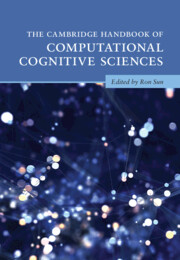Book contents
- The Cambridge Handbook of Computational Cognitive Sciences
- Cambridge Handbooks in Psychology
- The Cambridge Handbook of Computational Cognitive Sciences
- Copyright page
- Contents
- Preface
- Contributors
- Part I Introduction
- Part II Cognitive Modeling Paradigms
- 2 Connectionist Models of Cognition
- 3 Bayesian Models of Cognition
- 4 Symbolic and Hybrid Models of Cognition
- 5 Logic-Based Modeling of Cognition
- 6 Dynamical Systems Approaches to Cognition
- 7 Quantum Models of Cognition
- 8 Constraints in Cognitive Architectures
- 9 Deep Learning
- 10 Reinforcement Learning
- Part III Computational Modeling of Basic Cognitive Functionalities
- Part IV Computational Modeling in Various Cognitive Fields
- Part V General Discussion
- Index
- References
10 - Reinforcement Learning
from Part II - Cognitive Modeling Paradigms
Published online by Cambridge University Press: 21 April 2023
- The Cambridge Handbook of Computational Cognitive Sciences
- Cambridge Handbooks in Psychology
- The Cambridge Handbook of Computational Cognitive Sciences
- Copyright page
- Contents
- Preface
- Contributors
- Part I Introduction
- Part II Cognitive Modeling Paradigms
- 2 Connectionist Models of Cognition
- 3 Bayesian Models of Cognition
- 4 Symbolic and Hybrid Models of Cognition
- 5 Logic-Based Modeling of Cognition
- 6 Dynamical Systems Approaches to Cognition
- 7 Quantum Models of Cognition
- 8 Constraints in Cognitive Architectures
- 9 Deep Learning
- 10 Reinforcement Learning
- Part III Computational Modeling of Basic Cognitive Functionalities
- Part IV Computational Modeling in Various Cognitive Fields
- Part V General Discussion
- Index
- References
Summary
Reinforcement learning (RL) is a computational framework for an active agent to learn behaviors on the basis of a scalar reward feedback. The theory of reinforcement learning was developed in the artificial intelligence community with intuitions from psychology and animal learning theory and mathematical basis in control theory. It has been successfully applied to tasks like game playing and robot control. Reinforcement learning gives a theoretical account of behavioral learning in humans and animals and underlying brain mechanisms, such as dopamine signaling and the basal ganglia circuit. Reinforcement learning serves as the “common language” for engineers, biologists, and cognitive scientists to exchange their problems and findings in goal-directed behaviors. This chapter introduces the basic theoretical framework of reinforcement learning and reviews its impacts in artificial intelligence, neuroscience, and cognitive science.
Keywords
Information
- Type
- Chapter
- Information
- The Cambridge Handbook of Computational Cognitive Sciences , pp. 350 - 370Publisher: Cambridge University PressPrint publication year: 2023
